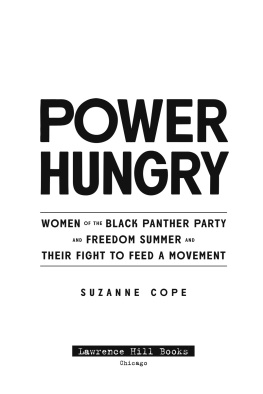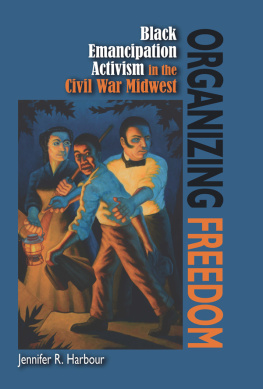This book was published with the assistance of the John Hope Franklin Fund of the University of North Carolina Press.
2016 The University of North Carolina Press
All rights reserved
Set in Arno by Westchester Publishing Services
Manufactured in the United States of America
The paper in this book meets the guidelines for permanence and durability of the Committee on Production Guidelines for Book Longevity of the Council on Library Resources.
The University of North Carolina Press has been a member of the Green Press Initiative since 2003.
Cover illustrations: Two Girls on a Swing facing Mileston (Mississippi) Head Start Center and Ms. Winson Hudson, of the Harmony Community Head Start Center, leading three youth down a dirt path, on a nature hike, 1968, 2015 by Bob Fletcher
Library of Congress Cataloging-in-Publication Data
Sanders, Crystal R., author.
A chance for change : Head Start and Mississippis Black freedom struggle / Crystal R. Sanders.
pages cm (The John Hope Franklin series in African American history and culture)
Includes bibliographical references and index.
ISBN 978-1-4696-2780-9 (pbk : alk. paper)ISBN 978-1-4696-2781-6 (ebook) 1. African AmericansSocial conditions19641975. 2. African American womenMississippiSocial conditions. 3. African American teachers and the communityMississippi. 4. African AmericansCivil rightsMississippiHistory20th century. 5. Child Development Group of MississippiHistory. 6. Head Start programsMississippi. I. Title. II. Series: John Hope Franklin series in African American history and culture.
E185.86.S257 2016
323.11960730762dc23
2015028001
Acknowledgments
When the Reverend Doctor Martin Luther King Jr. accepted the Nobel Peace Prize in 1964, he remarked, Every time I take a flight, I am always mindful of the many people who make a successful journey possiblethe known pilots and the unknown ground crew. This book came to fruition because of a host of people and institutions who invested in my well-being through their time, talent, and treasure. I am indebted to everyone mentioned belowmy known pilots and unknown ground crewand I do not take your unwavering support of me lightly. Thank you!
First, I would be remiss if I did not acknowledge the individuals who shared their stories and experiences with me. Thank you for returning my phone calls and inviting me into your homes. We talked for hours, laughing and crying, reminiscing about the most radical Head Start program in the nation. We became friends in the process. I am thankful for every interview, every piece of memorabilia shared, and every friendship cultivated. A few people I must call by name are Polly Greenberg, Marilyn Lowen, Marvin Hoffman, John Mudd, Lucia Clapps Mudd, Paul Murray, Doris Derby, Lillie Ayers, Alice Giles, and Mable Giles Whitaker. Many of my interviewees passed away before I completed the project. My sincere hope is that I have done justice to the Child Development Group of Mississippi story.
I am also grateful to the institutions that provided financial support, including Northwestern University, the Ford Foundation, the Spencer Foundation, and the American Academy of Arts and Sciences. Pennsylvania State University provided funding and support in myriad ways. I am especially indebted to Bill Blair and the George and Ann Richards Civil War Era Center and Lovalerie King and the Africana Research Center. My colleagues in the Departments of History and African American Studies never hesitated to offer an encouraging word and smile. In particular, I thank Nan Woodruff and Lori Ginzberg for their close reading of the manuscript. Michael Kulikowski and Dan Letwin also provided unparalleled support.
I have had the good fortune of being mentored by first-rate scholars. Without their mentorship and training, I could not have crossed the finish line. Thank you from the bottom of my heart: Nancy MacLean, Martha Biondi, Darlene Clark Hine, Charles Payne, Ray Gavins, Peter Wood, Katherine Charron, David Cecelski, Dylan Penningroth, Felecia Kornbluh, Annelise Orleck, and John Dittmer. Thank you for reading drafts of my work and pushing me to be a better historian.
Historians are only able to do what we do because of archivists. I am indebted to the archivists who mailed me documents I realized I needed after completing an archival visit, who fulfilled my numerous photocopy requests, and who pointed me in the direction of collections I needed to be aware of. In particular, I owe a debt to Joellen ElBashir of the Moorland-Spingarn Research Center at Howard University; Lisa Jacobson of the Presbyterian Historical Society; Jennifer Ford of the University of Mississippi Archives and Special Collections; Mattie Sink Abraham of the Mississippi State University Special Collections; and Minnie Watson of the Tougaloo College Archives.
A larger community of friends and scholars made the project a labor of love. Thank you for reading drafts, sharing meals, and cheering me on: Nickie Burney, Martina Bryant, Kellie Carter-Jackson, Brandon Dorsey, Jessie Dunbar, Mary Maples Dunn, Reginald Ellis, Brett Gadsden, Reena Goldthree, Cynthia Greenlee, Dominic Harris, Ade Hassan, Brandi Hinnant-Crawford, Marva Hinton Gibson, Jason Morgan Ward, Cynthia Pierre, Michelle Purdy, Leah Wright Riguer, Carmen Scott, LaKisha Simmons, Patricia Meyer Spacks, William Sturkey, Elizabeth Todd-Breland, and Debbie Wahl.
Finally, I must thank my family for their love, encouragement, and support. My first history lessons came from my elders who kept alive our family stories of faith, perseverance, and education. I will forever be thankful for the love, support, and precepts of my late grandparents, Jesse and Victoria Shepherd and Nathaniel and Ida Sanders. Thinking of extended family, I give special thanks to my uncle and aunt, Bill Lawson and Renee Sanders-Lawson, who showed early interest in the project and cheered me on. My sister, Natalie Sanders, read and edited several drafts and believed in me when I doubted myself. Last, but certainly not least, I thank my parents, Nathaniel L. Sanders Jr. and Velvaline Sanders, who have been by my side my entire life. Thank you for the prayers and limitless support in varied forms. You two made conferences and archival trips more enjoyable. You helped me get to the finish line. This book is dedicated to you both.





